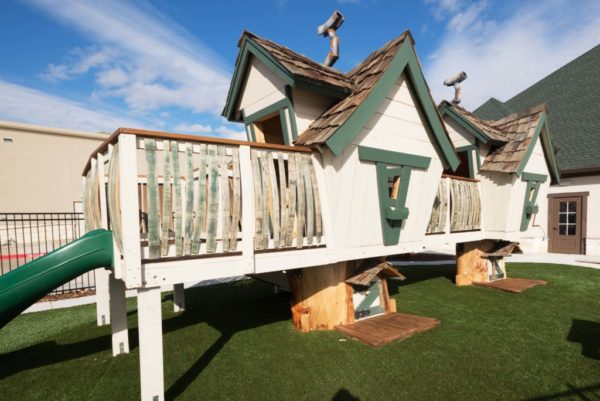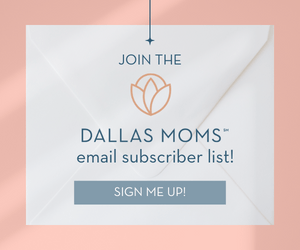**This post has been sponsored by Little Sunshine’s Playhouse & Preschool to bring you this experience. All opinions are 100% our own!**
 Step right up if you’re starting to think about preschool programs for your child. It’s a big milestone!
Step right up if you’re starting to think about preschool programs for your child. It’s a big milestone!
Before you tackle the question of where to enroll, let’s discuss some of the major things to know when considering a preschool. Big thanks to Little Sunshine’s Playhouse & Preschool of Southlake for providing us with great info on the importance of Early Childhood Education. They are definitely one to consider if you live or work in the Southlake area.
Top 5 Things to Know About Early Childhood Education:
1. What’s the difference between preschool and daycare?
The perception is that preschools are more educational while daycares are more custodial, although a good daycare will ideally have plenty of educational and developmental opportunities, too.
Preschools must be licensed, and most teachers have some training in early childhood education. Regulations are in place to provide standards for safety, teacher/student ratios, continued staff education, etc.
At Little Sunshine’s, for example, educators undergo initial and ongoing, continued education in best practices, Reggio Emilia implementation, mandated reporting, and more. Plus, Little Sunshine’s constantly evaluates for quality assurance to exceed license standards.
2. What are the major developmental areas for preschool-aged children?
- Cognitive skills
- Language (receptive and expressive)
- Social skills
- Gross-motor skills
- Fine-motor skills
You’ll want to find a program that provides opportunity for growth in all these developing areas. Early Childhood is a huge time for brain development, and preschool can really maximize the opportunities for kids to learn and grow.
3. What are the different types of early childhood education?
This is where we get into the various learning philosophies (Montessori, Waldorf, and Reggio Emilia are the big three). You can also opt for a co-op preschool, which is super dependent on parent involvement. Parents help run those schools and must commit to helping out in the classroom on a regular basis.
Little Sunshine’s private preschool employs Reggio Emilia, a philosophy which aims to foster curiosity and creativity. The goal is to help cultivate a lifelong passion for learning and exploration. It’s play-based and project-based, providing lots of opportunities for kids to solve problems and resolve conflicts using cooperation. If you click the link above, you can see photos of the kinds of projects they do at Little Sunshine. Quite frankly, they look GREAT.
Reggio Emilia programs are also known for documenting what children do each day. Little Sunshine’s has a secure online portal where they share photos and notes on your child’s specific activities, disposition/mood, sleeping and eating trends during the day. That is SO appealing to my left brain.
Montessori is all about independence. Children learn at their own pace, which translates to mixed-aged classrooms for ages 3-5. Usually, kids will have the same teacher over these years, and older children are encouraged to act as role models and help the younger ones, which helps build self-esteem.
Waldorf also does mixed-aged classrooms with the same teacher over the years. They are very big on structure and dependable routines during the week. Learning is play-based, and specifically uses no tech media; wooden blocks and natural materials all the way.
4. How will preschool prepare my child for Kindergarten?
Kindergarten is quite structured and academic, and a good preschool will help your child build the skills needed to thrive in a “big kid” environment. Think of their self-esteem and confidence going into Kindergarten after they’ve had a solid preschool base. As with anything, a good foundation is key.
To best prepare for Kinder, you’ll want to find a preschool program with a defined curriculum and structured lesson plans. We’re looking for age-appropriate activities that encourage cognitive, social, emotional, and physical development. And we want to see hands-on learning experiences both indoors and out. Bonus points for schools that offer extra enrichment like sports, yoga, foreign language, music, etc.
5. What are the benefits of good early childhood education?
It can help set the tone, so to speak, for the rest of your child’s educational journey. Studies show that preschool “graduates” have increased high school graduation rates, significantly lower discipline referrals in elementary school, and higher scores on math and reading tests.
If you’re looking for a school that values the importance of early childhood education, have a look at Little Sunshine’s Playhouse & Preschool. They focus on specific developmental goals from their infant childcare program all the way through the preschool and pre-K programs, and the reviews are STELLAR.
Start by browsing their website; you’ll quickly see that this is top-tier early education. Oh, and you have to check out their super cute playgrounds. Those houses!













